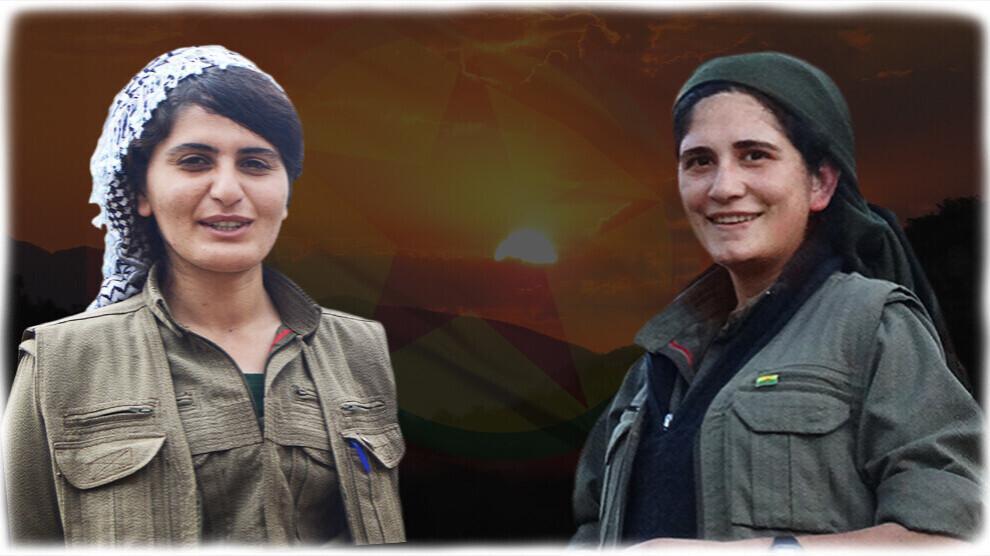
Guerrillas Avînar Merîvan and Rûken Sipêrtî died in a Turkish attack on Xakurke in 2018. The People’s Defense Forces (HPG) paid tribute to them, saying there were courageous revolutionaries of their people and selfless defenders of a free life. The HPG expressed its condolences to the families of the fallen and the Kurdish people.
Avînar Merîvan
Avînar Merîvan was born in Amed as the daughter of a family close to the Kurdish liberation struggle. Politicized at an early age in her patriotic home, she was confronted as a schoolgirl with the repressive denial and assimilation policies in Kurdistan, legitimized by the state’s ideology, and the degeneration of the youth forced by the system. That is why she became involved in the Kurdish youth movement. She continued this activism as a student in Amed.
During her time at university, Avînar Merîvan was repeatedly targeted by the state and was arrested several times. These experiences, coupled with intensive reading of the ideology of the Kurdish liberation movement – her brother Mervan Amed had joined the guerrillas in 2009 – shaped her views on the reality that every generation of Kurds had grown up under martial law, a state of emergency or in war for a century. She decided to escape the system and go to the mountains. In 2012, when the Rojava revolution was just approaching, she joined the guerrillas in Amed.
Avînar Merîvan received her military training in Metîna in South Kurdistan, then she went to Garê. In 2013, her brother was killed in the revolutionary people’s war in Geliyê Tiyarê. His loss was the decisive factor in her desire to fight on the fronts of the hot war. As a member of the Association of Free Women (YJA Star), she moved to Xakurke in the same year. The HPG described Avînar Merîvan as a persistent militant who did not deviate from the principles of the apoist philosophy even under the most difficult conditions.
“Comrade Avînar had a personality who, with her enthusiastic participation, awakened determination and the will to fight in all her friends and companions and gave them courage. With this quality, she knew how to secure a place for herself in everyone’s hearts. With her clear stance on the line of women’s liberation, her unwavering commitment to Rêber Apo and our liberal values and an unwavering friendship, she has left traces that can no longer be erased.”
Rûken Sipêrtî
Rûken Sipêrtî was born in Silopi in the province of Şirnex (Şırnak). Her family, which has a tradition of resistance, belongs to the Sipêrtî tribe based in Botan. Through these family connections and a political environment, she became acquainted with the Kurdish liberation movement at an early age. However, this was also related to the omnipresent oppression of the Kurdish population and the experiences of the scorched earth policy that turned more than 3,000 villages in Kurdistan into ashes in the 1990s.
Initially active in the political sphere for a while, in 2012 Rûken Sipêrtî decided to become part of the armed struggle against the Turkish state’s policy of war of annihilation. The path to the guerrillas led her to the Cûdî Mountains. Here she underwent basic military training, then she went to the Herekol region. When Abdullah Öcalan, the mastermind and founder of the PKK who has been imprisoned in Turkey since 1999, announced a historic ceasefire and the withdrawal of the guerrillas from North Kurdistan in March 2013 as part of the dialogue process with the Turkish state that was later unilaterally broken off by Ankara, which was intended to clear the way for a democratic solution to the Kurdish question, she went to the Medya Defense Areas.
In Heftanîn, Rûken Sipêrtî completed in-depth military training and acquired special skills and abilities for various areas of guerrilla warfare. Ideologically, she dealt intensively with the paradigm of the women’s liberation struggle and the YJA Star. In 2014, she went to Rojava as part of a mobilization to take part in the resistance against the terrorist organization Islamic State. During a mission in Jaza (Jazaa) on the border with Iraq, she was injured in the head when clashes broke out. She was able to recover quickly and return to the front. This time she went to Kobanê, where she took part in the great resistance in the city, which was then surrounded by ISIS, and suffered another injury.
Rûken Sipêrtî spent a total of two years in Rojava before moving to her hometown of Silopi, where the resistance for self-government in Kurdistan led by the Civil Self-Defense Units (YPS) emerged in 2016. After a while, she returned to the Medya Defense Areas, where she fought in Xakurke until her death. The HPG describes her as a “courageous comrade” who was respected and valued by all sides for her claim to represent the identity of the free woman.